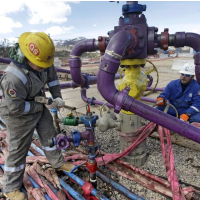Benefits of Natural Gas as Vehicle Fuel Negated by Harmful Methane Leaks
 (photo: Brennan Linsley, AP)
(photo: Brennan Linsley, AP)
City buses, passenger vehicles, and even garbage trucks often bear signage proclaiming that the owners are doing their parts for the environment by burning natural gas, instead of diesel, in their vehicles. But a new study shows that switching to natural-gas-powered vehicles might produce more greenhouse gases than would occur by sticking with diesel power.
The production and distribution of natural gas appears to release much more methane into the atmosphere than originally estimated by the Environmental Protection Agency, according to a study published in the journal Science. Methane is one of the most pernicious greenhouse gases. It’s about 100 times as potent as carbon dioxide shortly after being released into the atmosphere and remains 34 times as potent as CO2 after 100 years in the atmosphere, according to a Climate Central article.
So when the emissions of a natural-gas-powered vehicle are combined with the methane that escapes from the natural-gas supply chain, there are more harmful gases emitted than in similar circumstances with a diesel-powered vehicle. “Switching from diesel to natural gas, that’s not a good policy from a climate perspective,” the study’s lead author, Adam R. Brandt, an assistant professor in the department of Energy Resources Engineering at Stanford University, said in The New York Times.
Government officials who have urged the use of natural gas as a fuel, promoting it as cleaner and as coming from a domestic source, might now have to rethink their position.
The leaks are a problem in both traditional and hydraulic fracturing, or fracking, gas production. Methane emitted during fracking is significant, but is a small fraction of the methane emitted overall in natural-gas production, according to study co-author and Massachusetts Institute of Technology lecturer Francis O’Sullivan.
The report did say that natural gas might regain its standing as a clean fuel if producers were required to install equipment to keep methane from leaking into the atmosphere during the production and transport of natural gas. The gas production industry has resisted such efforts, however.
“The industry has led efforts to reduce emissions of methane by developing new technologies and equipment, and these efforts are paying off,” Carlton Carroll, a spokesman for the American Petroleum Institute, which lobbies for oil and gas companies, told the Times. “Given that producers are voluntarily reducing methane emissions, additional regulations are not necessary.”
There’s still a place for natural gas in our efforts to clean the atmosphere. Gas-fired power plants are still significantly cleaner than those powered by coal, even when methane leakage is accounted for.
Other research has shown that there is much more methane in our atmosphere than previously thought. One study showed that by using a different method—taking samples from tall structures and airplanes—a 50% increase in methane was measured over EPA estimates.
Methane also has been shown in some EPA documents to affect water quality in areas near fracking sites.
-Steve Straehley
To Learn More:
Study Finds Methane Leaks Negate Benefits of Natural Gas as a Fuel for Vehicles (by Coral Davenport, New York Times)
Natural Gas May Benefit Climate Despite Methane Leaks (by Bobby Magill, Climate Central)
U.S. Methane Emissions May be 50% Higher than EPA Estimates (by Noel Brinkerhoff and Danny Biederman, AllGov)
Internal EPA Report Conflicts with Agency’s Stance on Fracking Contamination in Pennsylvania Town (by Noel Brinkerhoff, AllGov)
- Top Stories
- Unusual News
- Where is the Money Going?
- Controversies
- U.S. and the World
- Appointments and Resignations
- Latest News
- Trump to Stop Deportations If…
- Trump Denounces World Series
- What If China Invaded the United States?
- Donald Trump Has a Mental Health Problem and It Has a Name
- Trump Goes on Renaming Frenzy






Comments